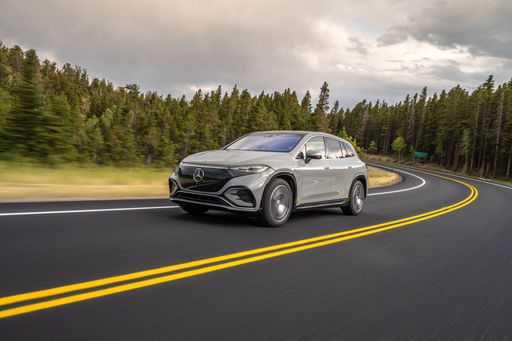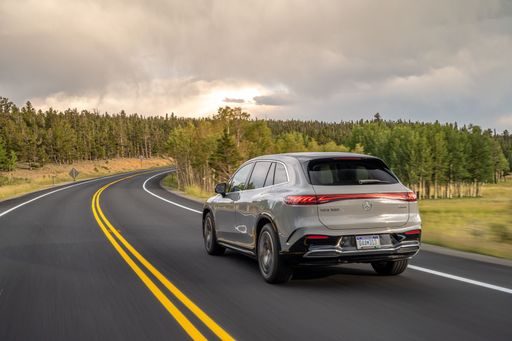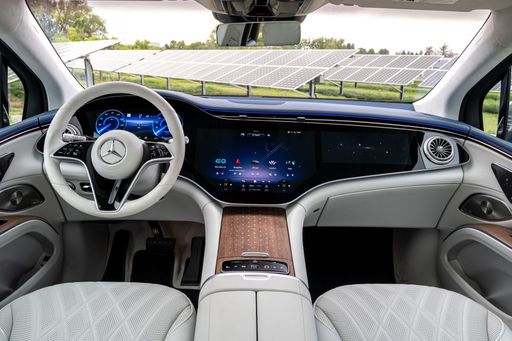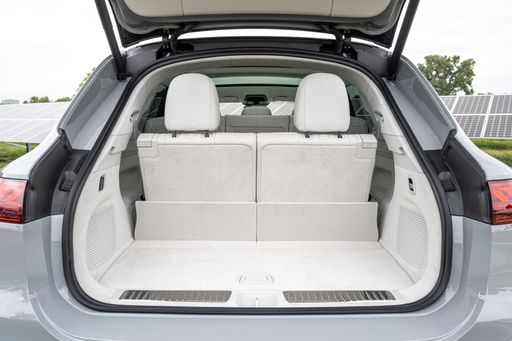Mercedes EQS SUV vs Toyota Prius – Differences & prices compared
Compare performance, boot space, consumption and price in one view.
Find out now: which car is the better choice for you – Mercedes EQS SUV or Toyota Prius?
The Mercedes EQS SUV (SUV) comes with a Electric engine and Automatic transmission. In comparison, the Toyota Prius (Hatchback) features a Plugin Hybrid engine with Automatic transmission.
When it comes to boot capacity, the Mercedes EQS SUV offers 645 L, while the Toyota Prius provides 284 L – depending on how much space you need. If you’re looking for more power, decide whether the 658 HP of the Mercedes EQS SUV or the 223 HP of the Toyota Prius suits your needs better.
In terms of consumption, the values are 19.60 kWh per 100 km for the Mercedes EQS SUV, and 0.50 L for the Toyota Prius.
Price-wise, the Mercedes EQS SUV starts at 95000 £, while the Toyota Prius is available from 39400 £. Compare all the details and find out which model fits your lifestyle best!
Mercedes EQS SUV
The Mercedes-Benz EQS SUV redefines luxury in the electric vehicle segment with its elegant design and cutting-edge technology. Its spacious interior provides exceptional comfort, featuring high-quality materials and innovative ambient lighting to create a serene driving environment. This SUV impressively combines sustainability with performance, offering a smooth and quiet ride without compromising on power.
details @ group-media.mercedes-benz.com
@ group-media.mercedes-benz.com
 @ group-media.mercedes-benz.com
@ group-media.mercedes-benz.com
 @ group-media.mercedes-benz.com
@ group-media.mercedes-benz.com
 @ group-media.mercedes-benz.com
@ group-media.mercedes-benz.com
Toyota Prius
The Toyota Prius stands as a pioneer in the realm of hybrid vehicles, offering an eco-friendly driving alternative with its innovative technology. Its aerodynamic design and comfortable interior make it a practical choice for those looking to reduce their carbon footprint without sacrificing style. Additionally, the Prius boasts a reputation for reliability and efficiency, contributing to its lasting popularity among environmentally conscious drivers.
details @ Toyota
@ Toyota
 @ Toyota
@ Toyota
 @ Toyota
@ Toyota
 @ Toyota
@ Toyota

|

|
|
|
|
Costs and Consumption |
|
|---|---|
|
Price
95000 - 212100 £
|
Price
39400 - 45800 £
|
|
Consumption L/100km
-
|
Consumption L/100km
0.5 - 0.7 L
|
|
Consumption kWh/100km
19.6 - 21.9 kWh
|
Consumption kWh/100km
-
|
|
Electric Range
615 - 695 km
|
Electric Range
72 - 86 km
|
|
Battery Capacity
108.4 - 118 kWh
|
Battery Capacity
-
|
|
co2
0 g/km
|
co2
12 - 17 g/km
|
|
Fuel tank capacity
-
|
Fuel tank capacity
40 L
|
Dimensions and Body |
|
|---|---|
|
Body Type
SUV
|
Body Type
Hatchback
|
|
Seats
4 - 5
|
Seats
5
|
|
Doors
5
|
Doors
5
|
|
Curb weight
2695 - 3075 kg
|
Curb weight
1620 - 1630 kg
|
|
Trunk capacity
440 - 645 L
|
Trunk capacity
284 L
|
|
Length
5125 mm
|
Length
4599 mm
|
|
Width
1959 - 2034 mm
|
Width
1782 mm
|
|
Height
1718 - 1721 mm
|
Height
1470 mm
|
|
Payload
425 - 570 kg
|
Payload
365 - 375 kg
|
Engine and Performance |
|
|---|---|
|
Engine Type
Electric
|
Engine Type
Plugin Hybrid
|
|
Transmission
Automatic
|
Transmission
Automatic
|
|
Transmission Detail
-
|
Transmission Detail
-
|
|
Drive Type
All-Wheel Drive, Rear-Wheel Drive
|
Drive Type
Front-Wheel Drive
|
|
Power HP
360 - 658 HP
|
Power HP
223 HP
|
|
Acceleration 0-100km/h
4.4 - 6.8 s
|
Acceleration 0-100km/h
6.80 s
|
|
Max Speed
210 km/h
|
Max Speed
177 km/h
|
|
Torque
568 - 950 Nm
|
Torque
-
|
|
Number of Cylinders
-
|
Number of Cylinders
4
|
|
Power kW
265 - 484 kW
|
Power kW
164 kW
|
|
Engine capacity
-
|
Engine capacity
1998 cm3
|
General |
|
|---|---|
|
Model Year
2024
|
Model Year
2023
|
|
CO2 Efficiency Class
A
|
CO2 Efficiency Class
B
|
|
Brand
Mercedes-Benz
|
Brand
Toyota
|
Mercedes EQS SUV
Introduction to the Mercedes-Benz EQS SUV
The Mercedes-Benz EQS SUV stands as a testament to the capabilities of electric technology combined with luxury. Designed as an electric counterpart to its combustion-engine siblings, the EQS SUV offers opulent comfort, cutting-edge technology, and impressive performance metrics, all wrapped in a sustainable package.
Powertrain and Performance
At the heart of the EQS SUV lies a fully electric powertrain that varies across different models, offering power outputs ranging from 360 to 658 PS. These performance figures translate to an acceleration from 0 to 100 km/h in just 4.4 to 6.8 seconds, depending on the variant. The all-wheel drive configurations, with intricate dynamics and traction control, allow the EQS SUV to maintain optimal performance even in challenging conditions.
Battery and Range
The Mercedes-Benz EQS SUV offers a pioneering battery capacity of between 108.4 and 118 kWh. This substantial capacity contributes to the robust electric range of 599 to 709 km on a single charge, making long-distance travel feasible without frequent recharging stops. The efficiency of 19.1 to 22.5 kWh/100 km further demonstrates the SUV's capacity to maximise mileage while minimising energy consumption.
Interior and Comfort
Luxury is at the forefront of the EQS SUV's interior design. The cabin accommodates four to five passengers in an environment enriched with premium materials and state-of-the-art technology. The optional First Class 4MATIC line introduces seating and trim upgrades, ensuring a superior travel experience.
Technology and Innovation
The EQS SUV showcases Mercedes-Benz's commitment to innovation through features like the MBUX Hyperscreen, an expansive, high-resolution display that combines the instrument cluster, infotainment, and passenger display into a seamless unit. Advanced driver assistance systems further enhance safety and convenience, signalling Mercedes' ongoing pursuit of autonomous capabilities.
Exterior Design and Dimensions
Combining a sleek aesthetic with practical dimensions, the EQS SUV measures 5125 mm in length, 1959 to 2034 mm in width, and 1718 to 1721 mm in height. This design not only contributes to excellent aerodynamics but also maximises interior space, leading to a generous boot capacity of 440 to 645 litres.
Environmental Impact
With a CO2 efficiency class of A and zero direct emissions (0 g/km CO2), the EQS SUV embodies Mercedes-Benz’s commitment to a sustainable future. This electric SUV represents a key step in the company’s vision of electrification and reducing the automotive industry’s carbon footprint.
Conclusion
The Mercedes-Benz EQS SUV merges luxury with the practicality required for modern living, all while championing sustainability. Its wide range of performance options, expansive range, and innovative technologies make it a strong contender in the electric vehicle landscape, setting new standards for premium electric SUVs.
Toyota Prius
The All-New Toyota Prius: Revolutionising Efficiency and Performance
The Toyota Prius, a name synonymous with hybrid innovation, has once again shown why it remains at the forefront of eco-friendly automotive technology. The latest models have enhanced technical features and innovations, setting new standards for efficiency and driving experience.
Hybrid Performance: A Leap Forward
The latest Prius models employ a sophisticated 2.0 litre Plug-in Hybrid system that flawlessly melds petrol and electric power. With a power output of 223 PS, it propels the Prius with impressive dynamism, reaching 0-100 km/h in just 6.8 seconds. This performance-oriented aspect of the Prius does not compromise on efficiency, with an astonishing fuel consumption ranging from 0.5 to 0.7 L/100km.
Electric Range and Efficiency
One of the key highlights of the new Prius is its substantial electric-only range. Depending on the variant, it can travel between 72 to 86 km on electric power alone, making it an ideal choice for urban commutes where zero emissions are preferred. The hybrid system's CO2 emissions are remarkably low, between 12 and 17 g/km, contributing to its CO2 Efficiency Class B rating.
Engineering Excellence with CVT
The Prius is equipped with a state-of-the-art Continuously Variable Transmission (CVT), ensuring a smooth and efficient drive. This advanced transmission supports the front-wheel-drive layout, delivering power seamlessly and enhancing driving pleasure without sacrificing fuel economy.
Stylish Design and Comfort
Designed as a sleek five-door hatchback, the Prius offers a comfortable and spacious interior with seating for five passengers. It measures 4599 mm in length, 1782 mm in width, and 1470 mm in height, offering a practical balance of size and comfort. The boot space, while tailored for the hybrid battery, still provides a decent 284 litres of storage.
Cost Efficiency
The running costs of the Prius are competitive, with monthly expenses estimated between €1064 and €1188, and cost per kilometre ranging from 42.6 to 47.5 cents. Its efficient design results in a maximum speed of 177 km/h and a practical fuel tank size of 40 litres, ensuring less frequent stops on longer journeys.
Conclusion: The Prius Legacy Continues
The Toyota Prius continues to lead by example in the realm of hybrid technology. Combining impressive power with unmatched efficiency and a sophisticated driving experience, it is clear that the Prius remains a compelling choice for the environmentally conscious driver. Its innovative features and favourable cost metrics only bolster its appeal in the modern automotive landscape.
Which drive types are available for the Mercedes EQS SUV?
Available as .
The prices and data displayed are estimates based on German list prices and may vary by country. This information is not legally binding.
